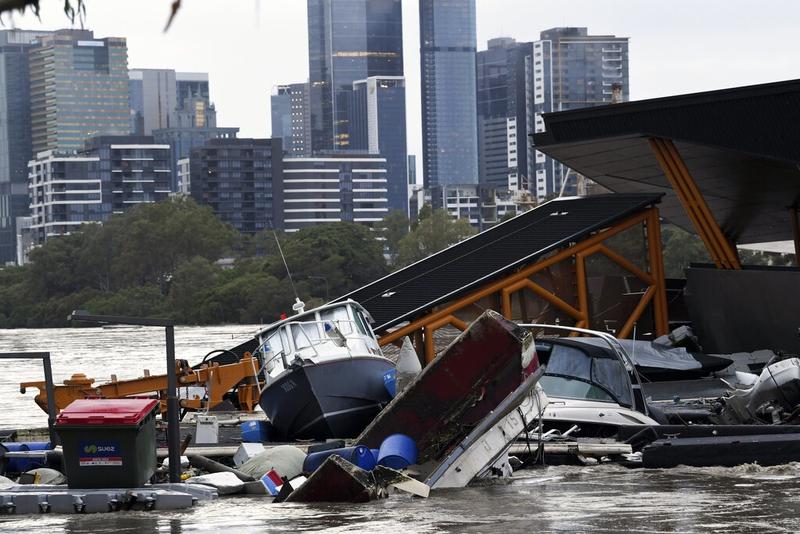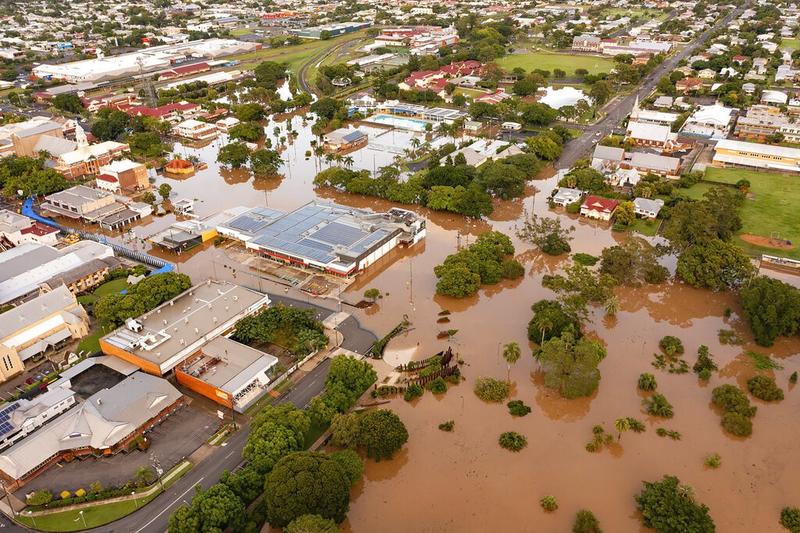 Boats and other debris are seen washed into the Milton ferry terminal on the Brisbane River in Brisbane, Australia, Feb 28, 2022. (DARREN ENGLAND / AAP IMAGE VIA AP)
Boats and other debris are seen washed into the Milton ferry terminal on the Brisbane River in Brisbane, Australia, Feb 28, 2022. (DARREN ENGLAND / AAP IMAGE VIA AP)
Large sections of eastern Australia have been declared disaster areas following the worst flooding ever recorded, which has left thousands homeless and at least 10 people dead with many more missing.
Towns and cities in northern New South Wales and southeast Queensland have been inundated by muddy brown water. Brisbane, the Queensland state capital and Australia’s third biggest city, is under water for the third time since 1974.
The Queensland premier, Annastacia Palaszczuk, told a media briefing on March 1 that 80 percent of Brisbane’s total annual rainfall fell on the city in just two days.
The Queensland premier, Annastacia Palaszczuk, told a media briefing on March 1 that 80 percent of Brisbane’s total annual rainfall fell on the city in just two days
Brisbane and surrounding suburbs have been turned into one brown lake, with the northern NSW town of Lismore under 14 meters of water after the 10-meter-high levee was breached.
Thousands of people have been displaced by the floods, with schools closed, roads and bridges destroyed by what meteorologists describe as a ‘rain bomb’.
ALSO READ: 'Weather bomb' floods Australia towns, people flee to rooftops
Rain bombs occur within a thunderstorm when hot, dry air is sucked into the storm. The air temperature gets colder suddenly, and that cold air can then drop very quickly, unleashing large amounts of rain onto the ground below.
With the front now moving down the NSW coast, that state’s capital and Australia’s largest city, Sydney, is bracing for serious flooding in the coming days.
Palaszczuk said the clean-up bill for Queensland could exceed A$1 billion ($727 million).
Professor Elizabeth Mossop, dean of Design, Architecture and Building at the University of Technology Sydney, said: “With the increasing frequency and severity of storms and flooding, we need to treat flood prevention and mitigation as part of our ‘business as usual’ and not as a one-off disaster.
“Any new development must be regulated to mitigate flooding and we have to think very much more seriously about retrofitting our existing urban and suburban areas,” she told China Daily.
 In this photo provided by the Fraser Coast Regional Council, water floods streets and buildings in Maryborough, Australia, Feb 28, 2022. (QUEENSLAND FIRE AND EMERGENCY SERVICES VIA AP)
In this photo provided by the Fraser Coast Regional Council, water floods streets and buildings in Maryborough, Australia, Feb 28, 2022. (QUEENSLAND FIRE AND EMERGENCY SERVICES VIA AP)
Queensland University of Technology Adjunct Professor Hilary Bambrick, co-author of Australia’s annual assessment of progress on climate adaptation, said: “Despite decades of warnings from scientists about climate change, Australia is unprepared for the supercharged weather that it is now driving, such as the current floods in Queensland and NSW.
READ MORE: Sydney sees worst floods in 60 yrs, thousands to be evacuated
“Australia is at the forefront of severe climate change,” Bambrick said. “Temperatures are rising faster in Australia than the global average, and higher temperatures mean the atmosphere holds more moisture, meaning rainfall events are becoming more extreme.”
She said a “national adaptation strategy” is required to better prepare and respond to increasingly catastrophic events. “We need to manage the impacts of what is happening now and make sure those impacts are much less destructive in future.”
The wild weather hammering Australia’s east coast comes at a time when the United Nations Intergovernmental Panel on Climate Change released its latest report on Feb 28, entitled “Impacts, Adaptation and Vulnerability”.
The report says regardless of actions now, regional and urban areas will face irreversible changes that will have an impact on millions of lives.
The report, compiled by almost 300 scientists across 67 countries, clearly spells out that climate change is already dramatically altering ecosystems, affecting our physical and mental health, water security and food production, cities and infrastructure, and more.
Climate change “means that our atmosphere can hold more water, likely increasing the intensity of rain events in the future”, said Andrew Gissing, an emergency management expert with the Bushfire and Natural Hazards Cooperative Research Centre and General Manager of Resilience at Risk Frontiers
Professor Will Steffen, member of the Climate Council of Australia, emeritus professor at the Australian National University, Canberra, and a former IPCC report author, said in a statement: “For most Australians, this report is long, technical and at times dry. But its message is anything but. We are being harmed by climate change now, and the future is potentially terrifying.
“We are seeing climate change play out in real time with unprecedented rainfall and flooding taking a horrible toll on communities in Queensland and NSW. These events will only get worse if we don’t act now to reduce emissions.”
Andrew Gissing, an emergency management expert with the Bushfire and Natural Hazards Cooperative Research Centre and General Manager of Resilience at Risk Frontiers, said climate change “means that our atmosphere can hold more water, likely increasing the intensity of rain events in the future”.
Rising sea levels will exacerbate future flooding in coastal areas over the coming decades, Gissing told China Daily.
The Climate Council’s research director, Simon Bradshaw, said Australia is “one of the most vulnerable developed countries in the world”.
“Right now, communities in southeast Queensland and northern NSW are being pummelled by extraordinarily intense rainfall and flooding,” he said. They had hardly had time to recover from past disasters and were again facing profound heartbreak and loss.
Bradshaw said communities, increasingly, were being hit with one disaster after another – “like drought followed by fire, followed by flood” – and the compounding effect was taking a heavy toll.
“The report is very clear,” he said. “Any further delay in global action will miss the brief and closing window to secure a livable future.”


